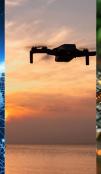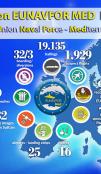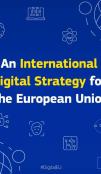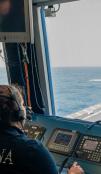Transcript of panel discussion between EU High Representative for Foreign Affairs and Security Policy, Kaja Kallas and Nick Vinocur, Editor at Large, Politco, at the Copenhagen Democracy Summit 2025
Nick Vinocur: Thank you very much High Representative, and welcome to Copenhagen. I want to start with a broad bat. Autocracy seems to be on the rise around the world, the results of the [2025 Democracy] Perception Index are quite alarming. Is Europe really alone in defending this liberal, democratic model in the world at this stage?
Kaja Kallas: I don't think we're alone. Actually what I've seen is a lot of countries from around the world at our door, wanting to co-operate, finding new ways to do that. Why is this so? Because, you know, something that has been maybe a weakness because we are so predictable and so boring, has become actually our strength. There is a lot of unpredictability in the world, so we can build on that strength. Of course, we need to co-operate around the world with the countries which are not perfect democracies; if we only choose the countries that are perfect democracies we can't also work with some countries that are within the European Union, but that's another topic. It's clear that we need to find a way to actually promote the values that we also stand for, because people really see that it brings benefits. It brings prosperity and the well-being of people.
NV: "Boring is good." We'll see if that's the next EU slogan!
KK: Choose boring! [Laughter]
NV: Some countries seem to be having trouble making a choice between autocracy and democracy. You mentioned that you were in the Western Balkans. Some of the leaders in that region decided to go to Moscow for the so-called victory parade. What would you say to them at this stage? Have they already made their choice in terms of which model to follow, or is the EU keeping its door open?
KK: You know, on the 9 May, when Putin was having his parade, we were together with the Foreign Ministers of the European Union, and not only the EU but also Norway, the UK, the Western Balkans. We were in Ukraine, and we visited a hospital in Lviv that is called "Superhuman". This hospital is treating patients who have lost one of their limbs. It one of 3 such hospitals in Lviv. After that we went to the cemetery Lviv. I was seeing all this human suffering, a lot of broken bodies but not broken souls. You can see that they clearly understand what they are fighting for. You can break my body, but you can't break me. I was thinking about all those leaders who stand by the person whose decision it is to actually send the soldiers to die in Ukraine, to kill civilians, to kill the other soldiers, to bring about all this suffering. I don't understand. How can you say to yourself that this is the right thing to do? "I want to be in the picture with that guy", you know? So what I want to say to [those leaders in Moscow], and I've already said this: go to Ukraine. Go and see for yourself. You don't have the courage to go there. See for yourself, then look in the mirror and ask yourself whether you are on the right side of history.
NV: Would you say they have set themselves back on the path to EU membership, by doing something like that?
KK: It is clearly a big issue. I can tell you that one of those countries wanted to send the military to march there [in Moscow]. Can you imagine? This is the biggest threat that Europe has: Russia. You want to join the EU, and then you send your military to march together with the forces that are actually attacking European security? How can you then really defend this and say that we want to take this military enemy within? It would be a complete no-go for many European countries, and it is hard. Show me who your friends are, and I will tell you who you are. We have 27 Member States in Europe, and I can already tell you 10 [Member States] for whom this is highly problematic.
NV: You're still doing a lot of travelling, as befits the job. You've just come here from London, you were with a group of EU foreign leaders, you urged Putin to respect the 30-day ceasefire. The question is, what's next from the European side? There have been more drone attacks this morning. What do you see as the next steps to keep up the pressure?
KK: It is clear that in order to have peace, you need at least two to want peace. It only takes one to want war. We see Putin has shown very clearly that he still wants war. They [Russia] wanted to make countries in the Global South to believe the narrative that Europeans or Ukrainians are just warmongers, they want war but Putin is a peaceful person just attacking and killing some civilians. They [countries in the Global South] bought this narrative, but now everybody can see that this is not the case. It has been 60 days since Ukraine agreed to a full and unconditional ceasefire, whereas we haven't seen that from Russia's side. We have seen that Russia is playing games. We, the European Union, have been united, calling for a ceasefire so that they [Russia and Ukraine] can sit down at the table and discuss peace, but we need to see some goodwill on the Russian side. What we can do is of course to put more pressure on Russia to also want peace on their side. The tools that we have in our hands our economic tools, so sanctions. I also welcome the Lindsay Graham package that they are now discussing in [the US] Senate, which are very strong sanctions to really put the pressure on Russia. I think this sending a very good signal that also the Americans understand that in order to end this war, in order to end the killing, we should the pressure on the one who is doing the killing.
NV: The United States has really so far been the one who is leading these bilateral talks with Russia and Ukraine. How has Putin behaved in those talks? Is he being a trustworthy partner to Donald Trump? What would you say to Donald Trump?
KK: There haven't been any bilateral talks between Ukraine and Russia. There has been shuttle diplomacy, really. There have been envoys from the US going there. It's important to keep in mind that [there should be] nothing about Ukraine without Ukraine. We can see them agreeing to things and coming back to ideas that are completely unacceptable for Ukraine, or for Europe for that matter. Then it can't really fly. I understand what the Americans are trying to do, which is to really keep their door open so that Russia would come to the table. That's why they maybe haven't put that much pressure on Russia, but now it has been over 60 days. We need to some other steps so that we see Putin at the negotiating table.
NV: On Thursday, what do you expect? [Ukrainian President] Zelenskyy just confirmed this morning that he will go to Ankara. Do you expect to see other leaders around that table?
KK: It's a big question. I think Zelenskyy did well to say, "OK, I'm willing to meet Putin and let him come." I don't know if we are off the camera or on the camera here, but I'd like to express my opinion here. It's hard.
KK: I think it's a good move. It's a sit down. It should be between Zelenskyy and Putin. I don't think Putin dares.
NV: You talked about raising the pressure on Russia. You mentioned a 17th package of sanctions, but there are obstacles. There are countries in Europe that are standing in the way of that sanctions policy. Does Europe have to take steps to safeguard its sanctions policy, its security policy, to make sure that one country can't derail the whole thing? How would that work?
KK: First, we are working on the 17th package and, so far, let's hope tomorrow is one day where we will see whether we have an agreement or not, but I am positive that we are moving with this and of course preparing other packages as well. Coming to your question -
NV: So you think there might be an agreement on sanctions?
KK: I mean, no, tomorrow there is a big meeting of Ambassadors, so we get the feeling about what kind of fights we are up to. So far, I don't know what I have to do, but in general terms of course it is a big problem. That's why we are intensively doing the thinking [about] how to overcome that problem. I can tell you that we have prepared some different possibilities to overcome that. But the first aim is to have the agreement by everybody and I hope we will get there. Right now I am optimistic.
NV: I'm going to come in here with questions from the audience. Will the EU be willing to move ahead with assets worth 300 billion and making them available for the reconstruction of Ukraine?
KK: Again, my position is very clear. My personal opinion on this is that it is not fair that our taxpayers need to pay for something that we haven't destroyed. It's Russia that is doing the destroying. As a lawyer, I can find a way out of this problem. We have the assets, so Russia has a legitimate claim towards us. Ukraine has a legitimate claim towards Russia to compensate for the damages caused. So we can find a solution there. [We can] say that, you know, we are settling from this pot that we have for the reconstruction and then if there's anything left over, we can give it back. But we don't have the decision by everybody because, as you know, these assets are not evenly distributed across Member States. One in particular is bearing the most burden. So what is my approach now? Of course these things entail risks, but I think it's important that we really think about mitigation of those risks, because we need to have an exit strategy as well. We can't possibly imagine that, you know, Russia hasn't paid the damages to Ukraine and then we will simply give back what we actually have in our hands and start to claim it from Russia. In Estonian, we have a saying that a small bird in the hand is better than a big bird on the roof. So we have the small bird. Let's not give the small bird away when we can actually use that. We are working on that to bring everybody on board to go forward with the proposal.
NV: I want to take you to the Middle East for a second, because you're not just focused on Russia and the European neighbourhood. You're spending a lot of time over there [in the Middle East]. The other day you got a letter from the Dutch Foreign Minister sounding the alarm about the humanitarian situation in Gaza and he asked to review the EU-Israel Association Agreement. Have you thought about how you might want to respond to that?
KK: No, I mean, this is a big problem. Of course, before that letter I had also expressed and talked to the Minister of Israel and proposed different things. Because the problem is the humanitarian aid. When they are saying that it is weaponised by Hamas, and only given to people that are close to Hamas, then the response would be [to] flood Gaza with humanitarian aid so that there would be no deficit and it can't be used. Like you say, it can, so we are also offering our help. We have the EUBAM Rafah border crossing mission. We are also ready to increase this, to help with the distribution of humanitarian aid, but we are not allowed to. So for me, it is an immense frustration that we can't really do anything. Of course, we will have a discussion about this agreement. I know what the end result is going to be, because I know the positions of the Member States. Even if we suspended this agreement, it wouldn't stop the killing, and that is the problem. That's really where the frustration comes, because we all see that this is untenable, the loss of life, the human suffering, and we really need to help them. We are, together with Arab countries, discussing what more we can do, but again we need our American friends on board and to understand that the situation is completely untenable.
NV: Well, we hear you there: "Flood Gaza with aid", your call to Israel. Thank you so much, High Representative.
Watch the video (starting at 05:07)





